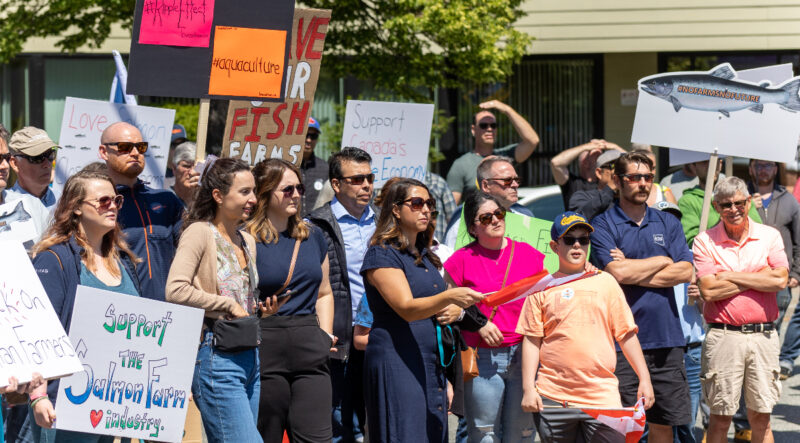Aquaculture in Canada needs strong, clear government support
“We need the strong and clear support of governments who recognize that aquaculture is the future of reliable, secure, sustainable and affordable supply of seafood”
By Fabian Dawson
SeaWestNews
Shutting salmon farms in British Columbia against the wishes of First Nations rightsholders and the advice of the government’s own scientists deeply undermines the confidence in Canada’s aquaculture sector, warn the nation’s seafood farmers.
“This is happening while other nations move ahead with expanding their aquaculture production with bold goals for growth,” said the Canadian Aquaculture Industry Alliance (CAIA), the voice of Canada’s seafood farmers, who employ over 20,000 people across the country.
“We need the strong and clear support of governments who recognize that aquaculture is the future of reliable, secure, sustainable and affordable supply of seafood and job creation in rural, coastal and Indigenous communities across Canada,” said CAIA in a statement.
“And we need a strong and reliable regulatory framework for investment that provides clear goals and stability so that companies can trust that their long-term investments will be respected.”
In an open letter to the Canadian Council of Fisheries and Aquaculture Ministers (CCFAM), which is expected to convene at the end of June in Ottawa, CAIA said the unprecedented situation with the BC salmon farming sector has adversely impacted the country’s incredible aquaculture potential.
Canada’s opportunity to be the world’s best salmon farming nation is being squandered by a Liberal government more interested in getting votes from activists rather than relying on science and traditional indigenous knowledge to grow the industry, said Tim Kennedy, President & CEO of CAIA in a recent podcast.
Federal Fisheries Joyce Murray who is ideologically opposed to open-net aquaculture is working on a transition plan for salmon farming in BC, that will impact more than 4,700 jobs and $1.2 billion in economic activity annually.
About 40 per cent of the BC in-ocean salmon farming sector has already been closed, despite Department of Fisheries and Oceans (DFO) scientists and court rulings stating that the salmon farms in BC pose less than a minimal risk to wild stocks.
Last week, several First Nations leaders said there can be no true reconciliation if Murray keeps pushing her agenda to oust salmon farmers from the traditional territories of aquaculture-dependent Indigenous communities in British Columbia.
The Coalition of First Nations for Finfish Stewardship (FNFFS), has also called on the government to respect their jurisdictions and not take actions that would remove salmon farms from their territories.
CAIA is asking fisheries and aquaculture ministers convening for the June summit to consider the following;
1) A clear regulatory framework that will attract investment for innovation and provides the flexibility that allows First Nations to determine how they want to proceed within their territory, and license holders to work with those Nations to determine which technology or approach best aligns with the Nation’s vision and unique marine conditions.
It called for a whole-of-government approach to develop a BC transition plan that attracts investment and advances the development of new tools and technology, allowing Canada to become a global leader in innovative aquaculture. Where scientific evidence, properly evaluated through government science processes, indicates a need for practice changes (for example for enhanced environmental performance), we ask that governments move in a clear and intentional way to set new and reasonable performance targets based on this science advice. Companies should then be given the opportunity to innovate and change practices in a reasonable period of time to achieve these goals.
2) That the Canadian Shellfish Sanitation Program (CSSP), that has not received any new funding or programmatic review and improvement for over 20 years, be a priority for program improvement and funding so that shellfish farmers can open new sites, expand production and grow successfully.
3) The experience of Hurricane Fiona is yet another example of the need for a Business Risk Management program for shellfish in particular but for all Small Medium Enterprise (SME) aquaculture producers in general. Companies facing increasing risks from extreme weather or other factors deeply undermine the potential for long-term growth and development of the sector. The United States Department of Agriculture recently extended its business risk programs for all aquaculture producers, putting our Canadian producers at a competitive disadvantage.
4) We would ask CCFAM to make a recommendation that while DFO retain federal regulatory and science oversight over the aquaculture sector, that Agriculture and Agri-Food Canada be given the explicit role of being the federal economic development body for aquaculture. DFO’s proper, legal role is conservation of wild fish, and it cannot properly deliver support for the economic development of the seafood farming sector. Canada’s flatline in production for twenty years and now production decline of the sector points clearly to this need. Ongoing criticism of DFO’s perceived dual role by critics is undermining overall trust in DFO. This must change.
(Image – Hundreds of aquaculture workers turned out at a rally to save their jobs in Campbell River on June 1, 2023)

